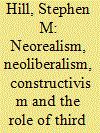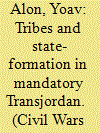| Srl | Item |
| 1 |
ID:
075015


|
|
|
|
|
| Publication |
2006.
|
| Summary/Abstract |
Conflict processes are determined both by the larger geopolitical context and the domestic political structure. Yet current studies tend to examine either international or domestic factors, neglecting their interaction. This article undertakes an analysis of the Tamil conflict in Sri Lanka in order to examine domestic-international intersections. In countries where civil war coexists with stable, democratic institutions, conflict management becomes a complex process of balancing competing demands within the government. Under such conditions, noncoercive intervention, such as mediation, can play a more constructive role than military action. The argument of this paper marks a shift from the existing literature which tends to focus on conflicts in failed, anarchic states where coercive intervention becomes necessary.
|
|
|
|
|
|
|
|
|
|
|
|
|
|
|
|
| 2 |
ID:
075014


|
|
|
|
|
| Publication |
2006.
|
| Summary/Abstract |
Although the greed-grievance approach has brought significant insight to the causes and conduct of civil wars by providing a coherent explanation of armed group motivations, it is increasingly being called into question. This article reconsiders the approach in light of insights gleaned from International Relations theory, specifically Realism. In particular, it will use the levels of analysis approach and the analytical separation between means and ends and between rhetoric and action to critique both greed and grievance explanations. The paper then proposes that the fungible concept of power and the primary motivation of survival provide superior explanations of armed group motivation and, more broadly, the conduct of internal conflicts. A case study of the Lord's Resistance Army (LRA), an armed group which is poorly understood in terms of greed-grievance, will illustrate the functional utility of a power-security approach.
|
|
|
|
|
|
|
|
|
|
|
|
|
|
|
|
| 3 |
ID:
075013


|
|
|
|
|
| Publication |
2006.
|
| Summary/Abstract |
This article reviews the explanations of the three major schools of international relations theory for the variation in success witnessed by third parties in the disarmament of civil warring factions. It concludes that, although rational theories like Neorealism and Neoliberalism have highlighted important aspects of the dynamics between the roles of third parties and disarmament, they provide only a partial analysis and must therefore be assimilated into a Constructivist framework.
|
|
|
|
|
|
|
|
|
|
|
|
|
|
|
|
| 4 |
ID:
075016


|
|
|
|
|
| Publication |
2006.
|
| Summary/Abstract |
Since its establishment the Hashemite Dynasty in Jordan has enjoyed the support of the Jordanian tribes. In a unique historical process, the tribes were integrated into the modern state structure and developed an interest in the very existence of the state and its regime. Despite the significance of this process, the roots of these exceptional relations between the tribes and state have been insufficiently explored. This article evaluates the tribes' response to state-formation processes during the formative years of the British mandate when the prospect of violent internal dissent was ever present. Contrary to the accepted scholarly understanding that in the early 1930s the central government already achieved the tribes' absolute surrender, this article shows that the tribes' integration was a long, dynamic process, which began with the formation of the Emirate of Transjordan in 1921 and continued well into the 1940s. The main argument is that even with the consolidation of the government's authority, the government did not achieve full control over the tribes, which remained a powerful force. Whereas the tribes benefited from governmental initiatives and played a role in the process of state-building, they opposed any attempt to constrict their autonomy. Though changed through this process, the tribes succeeded in preserving their influence to a greater degree than hitherto acknowledged in the current literature.
|
|
|
|
|
|
|
|
|
|
|
|
|
|
|
|